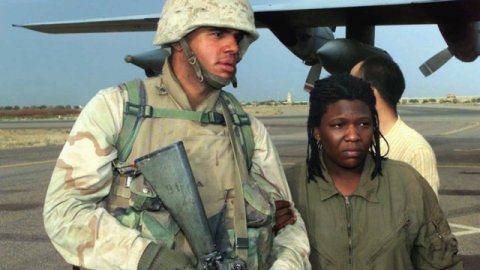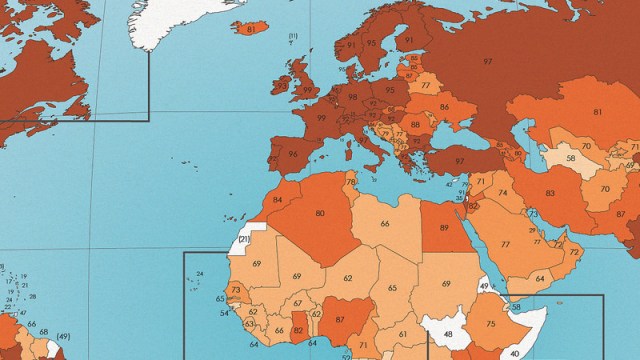God in Wartime: How Religious Belief Affects Soldiers

When Shoshana Johnson decided to join the military, her intention wasn’t to make history. Originally from Panama, where her Catholic foundation was laid, she and her family moved to the United States when she was a child. Johnson’s passion for food inspired her to attend culinary school. In 1998, the daughter of a retired Army sergeant, she enlisted in the service to save money for school. By 2003, Johnson, who worked as an Army cook, was in Iraq preparing meals for supply mechanics. But within a month of her arrival, she would become America’s first black female Prisoner of War (POW).
The first care package Johnson received after she deployed to the Middle East was from her mother. Inside the box was a rosary. “I remember calling back my mom as we got into Kuwait and saying, ‘Hey, I left my rosary and stuff on the nightstand. Can you send it to me?’” Johnson said from her home in El Paso, Texas. The rosary was inside her rucksack about 200 miles south of Baghdad when on March 23, 2003, a group of Iraqis ambushed the Army specialist’s truck convoy in Nasiriyah.
Johnson was shot in both ankles when she was captured; left behind was the rosary, still inside her rucksack, buried among the rubble and bodies of at least 11 American troops killed in the attack. Johnson and four male soldiers were taken prisoner, and spent 22 days in captivity. It has been 14 years since the former Army cook and other captives became national heroes upon their they return home, yet the psychological wounds, including Posttraumatic Stress Disorder (PTSD) continue to haunt her. While Johnson’s rosary was left in Iraq following her capture, she continued carrying her religious belief.
The relation between religious belief and trauma became a subject of study for Joseph Currier, an assistant professor of psychology at the University of South Alabama. His research examines the impact of religion, or spirituality, among combat veterans coping with life after war, and tries to understand how they might recover from the invisible scars of war. In a study published in Spirituality in Clinical Practice, Currier and others report “suicide has emerged as a leading cause of death for persons who have served in the United States (US) military. In fact, suicide deaths were more common than combat-related deaths among US military personnel in 2012 and 2013.” The report suggests that in some cases, religious belief can make healing from trauma more difficult. “Certain forms of religiousness do seem to increase risk for suicidality or PTSD after trauma,” Currier said.
Over the course of two years, Currier and his team recruited 125 veterans who had served in either Iraq or Afghanistan and completed “at least one war-zone deployment” to participate in the study. Therapists asked the veterans “to indicate how frequently they engaged in religious methods of coping with respect to the most stressful events of their lifetime.” Half of the study’s participants self-identified as being a “religious person,” and half of that group was affiliated with Christian Protestant organizations, while 40% identified as Roman Catholic.
According to Currier though, religious affiliation or church group denomination isn’t the most important factor in evaluating faith’s impact on mental health: “It’s not enough for us to know that somebody is religious or to know if they affiliate with Christianity or Buddhism, or to know their religious affiliation. What’s most important is that we know how somebody is religious.”
“I left any semblance of God in my life [back] in that fucking God-forsaken country,” says Mike Rudulph, a Marine Corps veteran who served two tours in Iraq. Rudulph did not participate in Currier’s study. “I gave up absolutely all notions or beliefs in any type of God after I saw what happened over there.” Born and raised in Alabama, Rudulph says he says he struggled with his Episcopalian faith as a gay man years before he saw combat. “Obviously, there were segments of the Episcopal Church in other places that embraced homosexuality, like the state who ordained the gay bishop, but at least where I was, it wasn’t there.”
Even after Rudulph’s partner joined the Marine Corps with hopes of being deployed together, the infantry sergeant hid details about his sexuality from his family and military unit. Rudulph was part of a division responsible for securing Iraqi detainees at Al-Taqqadum, an Iraqi air base about 20 miles west of Fallujah. There, his faith was regularly put to the test. How could God condone his war-fighting actions, yet condemn his sexuality? “The only God that I knew, in Alabama, was a God that was going to kick me into the depths of hell.”
In the study, Currier and the other researchers recognize “minimizing the risk for suicide among US military populations has become a major public health priority.” Among the veterans who participated in the study, Currier reports, just over a quarter, “exceeded the threshold of suicide risk.” In some cases, one’s religious or spiritual perceptions actually increased their risk of suicide ideation.
Felicia Hopkins, author of Halfway Home: War Stories that Healed My Life, is a retired Army officer and trauma chaplain who spent a year ministering to wounded service members. She says it’s often guilt that keeps troops from healing. “People [want] absolution,” said Hopkins. “People wanting to know that they’ll be forgiven, people wanting to know that God understood what they had to do … I did my part. Now God needs to do His part. “
“If someone has a very rigidly positive belief system, where they believe that I kind of have this implicit agreement with God that if I just do the right thing most of the time and try and be a really good person and refrain from doing things that are perceived as being immoral, that God is going to 100% protect me from suffering, or adversity in life,” said Currier, “they can go through periods of really high stress, potential trauma, and they’re not going to have any way to make sense of that within that very rigidly positive belief system. So what can then happen is they will then go on to the other side of things and over-accommodate where now God goes from being this all-good, all-powerful being, to now God is perceived as being completely untrustworthy and incompetent.”
Shoshana Johnson leaned on her faith when she tried to make sense of her capture and later her release. “I had this horrible incident, but I got to come home. I got to see my family again” said Johnson. “Other people don’t get that, and plenty of people have done nothing wrong and don’t get that, so I definitely think God has blessed me over and over and over again, and I don’t know why.”
Her interpretation of the Catholic Church’s position on suicide—it is classified as a mortal sin—impacted choices about whether to attempt to take her own life, which resulted in multiple stays at a Texas psychiatric medical center. “I was in the planning stages, and once I was in the hospital, we talked about it, and they were like, ‘Well, why?’ [and] I said, ‘Because I feel like God made a mistake, and then I can correct the mistake,’” Johnson recalled. She did not feel she’d earned the right to safely return home to her daughter and family. “In the Catholic faith, once you take your own life, that’s the ultimate sin, so all the preference [God] has given me will definitely end, at that point.”
Veterans who had a positive or broad perspective regarding the role of religion, or spirituality, in life fared better—those “with ties to formal religious groups” showed fewer signs of PTSD or suicidal thoughts and behavior. Perhaps, says Currier, veterans benefited from the support they found in their church or spiritual groups, not just doctrine. “Community can be crucial in supporting veterans who might be dealing with suicide or PTSD or other common mental health problems,” Currier said.
The study sample does not “mirror active-duty and veteran populations in the US.” Most of the veterans were men, young service members who’d served in either the Army or Marine Corps. But the report may help validate veterans’ requests for mental health providers who will take their religious and spiritual beliefs into consideration as part of their treatment plan. “It’s the only way it’s going to work,” says Johnson, who now gets care from a psychiatrist who also happens to be Catholic. “If you can’t accept my spirituality, how can I unload completely?”
After Shoshana Johnson’s mother reported the loss of her daughter’s rosary in an interview, Johnson said rosaries arrived at her home from all over the world. Instead of a rucksack, Johnson now carries a purse, and nestled inside one of its pockets is a rosary that she was told was blessed by Pope John Paul II.
—
Christina Brown Fisher is an independent journalist from New York City.




